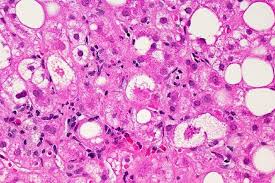Source: upi.com
The National Institutes of Health said Tuesday that researchers have found a new drug that can reduce liver fat and prevent progression of liver fibrosis in people with HIV.
Non-alcoholic fatty liver disease is a growing cause of serious liver problems in HIV-positive people with 25 percent of HIV-positive people impacted, according to a report released earlier this year.
The National Institute of Allergy and Infectious Diseases and the National Cancer Institute, both part of the NIH, conducted the new study with researchers from Massachusetts General Hospital in Boston.
The injectable hormone tesamorelin reduces liver fat in HIV-positive people, the NIH researchers and MGH colleagues reported, adding the drug also prevents liver fibrosis and scarring.
“Many people living with HIV have overcome significant obstacles to live longer, healthier lives, though many still experience liver disease,” NIAID Director Anthony Fauci said in an NIH press release. “It is encouraging that tesamorelin, a drug already approved to treat other complications of HIV, may be effective in addressing non-alcoholic fatty liver disease.”
The ectopic fat accumulates in the liver causing NAFLD, and the visceral fat increases cardiovascular and type 2 diabetes risk. Grinspoon originally developed testamorelin with his colleagues to burn excess abdominal fat in people living with HIV by triggering production of growth hormone.
“People with HIV who develop significant deposits of visceral fat have disturbed production of growth hormone (GH),” Grinspoon, “who first identified the phenomenon,” explained in statement. “GH oxidizes or ‘burns,’ visceral fat.”
Researchers studied 61 men and women with HIV and NAFLD to find out if tesarmorelin could also reduce liver fat and other signs of NAFLD.
In the study, “for more than one in three subjects given the drug (35 percent), liver fat was reduced to below the threshold for NAFLD,” compared with 4 percent who had a placebo, the agency said.
The drug also slowed fibrosis progression with just two people given the drug having advanced fibrosis compared to nine given a placebo.
